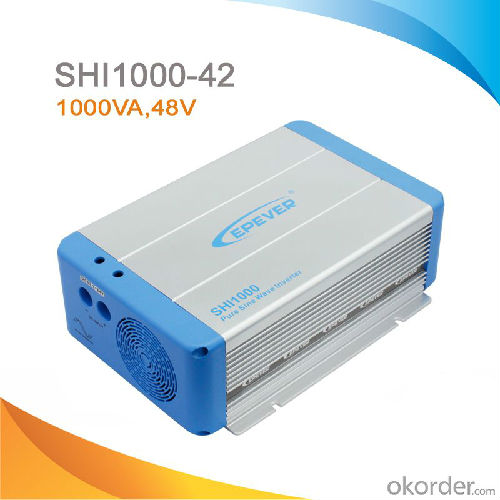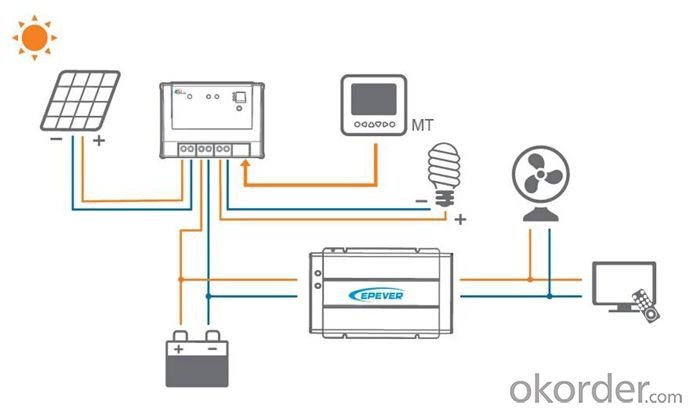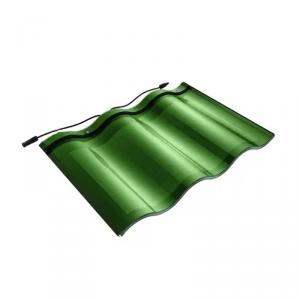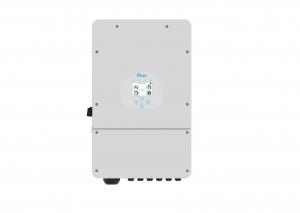Loading Port:China Main Port
Payment Terms:TT or LC
Min Order Qty:-
Supply Capability:-
Description
SHI series is a pure sine wave inverter which can convert 12/24/48Vdc to 220/230Vac 50/60Hz based on full digital and intelligent design. It features high reliability, high efficiency, concise outline, small volume, easy installation and operation. The inverter can be applied in many fields, such as household appliances, electric tools and industrial devices etc, especially for solar photovoltaic power system.

Features:
·Adoption of advanced SPWM technology, pure sine wave output
·Wide DC input voltage range
·The output voltage and frequency can be switched
·Low output harmonic distortion(THD≤3%)
·LED indicators for input voltage range, load power range, normal output & failure state
·Optional energy saving mode
·Wide working temperature range (industrial level)
Protections:
·Output short circuit protection
·Input low voltage protection
·Input over voltage protection
·Overheating protection
·Inverter abnormal protection

Specification:
Types | SHI1000-22 | SHI1000-42 |
Nominal Battery Voltage | 24V | 48V |
Input Voltage Range | 21.6~32Vdc | 43.2~64Vdc |
No Load Current | ≤0.45A | ≤0.35A |
Output Wave | Pure Sine Wave | |
Output Voltage | 220Vac±3% / 230Vac±10% | |
Continuous Power | 1000W | |
Power 10 sec | 1500W | |
Power 1.5 sec | 2000W | |
Surge Power | 2250W | |
Frequency | 50/60Hz±0.2% | |
Distortion THD | ≤ 3% (resistive load) | |
Efficiency at Rated Power | ≥93% | ≥93.5% |
Max. Efficiency | ≥94% | ≥94% |
Terminal | 25mm2 | |
Dimensions | 295×208×98mm | |
Installation | 150×200mm | |
Hole Size | Φ6mm | |
Net Weight | 3.3kg | |
Working Temperature | -20℃~ +50℃ | |
Storage Temperature | -35℃~ +70℃ | |
Humidity | < 95% (N.C.) | |
Altitude | < 5000m(Derating to operate according to IEC62040 at a height exceeding 1000m) | |
Insulation Resistance | Between DC input terminals and metal case: ≥550MΩ; Between AC output terminals and metal case: ≥550MΩ. | |
Dielectric Strength | Between DC input terminals and metal case: Test voltage AC1500V, 1 minute Between AC output terminals and metal case: Test voltage AC1500V, 1 minute | |
FAQ
Q:Off Grid VS On Grid Panels, what's the difference?
The differences between both panels are related to the system where they are going to be installed.
On-grid installations, as the name said, are thought to feed the produced energy into the grid and for that it is important to have the biggest voltage that it is allowed (1000VDC in Europe, 600 VDC in USA). For a defined power, more voltage means less current (P=V*I) and less losses.
In off-grid installations it is different because you must storage the energy into batteries. Batteries usually work at 12, 24 or 48 VDC and off-grid photovoltaic modules work at the maximum power point (mpp) near this voltage (see the datasheets). So the controller that charges the batteries works also near the batteries voltage.
Your limiting factor here is going to be this controller. You have to see what is the maximum voltage and the maximum current that it can work with, upstream (photovoltaic modules) and downstream (batteries and inverters). Then you have to dimension your PV array (Voltage and Current).
Of course you can run lights without inverters. Both LEDs and incandescent lamps are quite happy on DC. And there are fluorescent ballasts that take a DC input (although they do have a sort of inverter inside). I have one in my shed and it has been working just fine for at least 15 years. It is very simple, easy and efficient. You can do away with the electrical code for wiring, lower you cost. Use less energy and lower the cost to install. In fact is we did this to power may of our day to day items we would also lower the demand for power.
Keep in mind this goes against every manufacturer and government policy and you will be shut down, squashed and run out of town for even talking about this, or at least you used to. I am working on a way to use the current wiring in a home to have direct solar, batter bank lighting. By coming off the grid for your lighting and many other functions, a power outage would hardly make a difference to your home.



